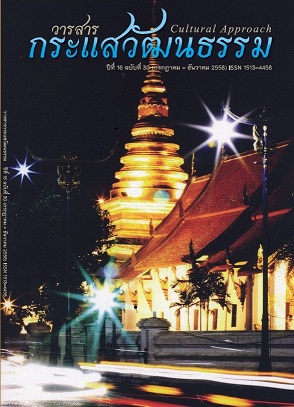ความพึงพอใจของนักท่องเที่ยวในการท่องเที่ยวตลาดย้อนยุค : กรณีศึกษาตลาด เกาะกลอย อำเภอเมือง จังหวัดระยอง
Main Article Content
บทคัดย่อ
การศึกษาครั้งนี้ มีวัตถุประสงค์เพื่อศึกษาความพึงพอใจของนักท่องเที่ยวในการเดินทางท่องเที่ยว ตลาดเกาะกลอย อำเภอเมือง จังหวัดระยอง จำแนกตามลักษณะส่วนบุคคลโดยใช้การวิจัยเชิงปริมาณและใช้กลุ่มตัวอย่างคือ นักท่องเที่ยวจำนวน 384 คน รวบรวมข้อมูลโดยใช้แบบสอบถาม สถิติที่ใช้ในการวิเคราะห์ ได้แก่ สถิติเชิงพรรณนา คือจำนวนความถี่ ร้อยละ ค่าเฉลี่ย และส่วนเบี่ยงเบนมาตรฐาน และใช้สถิติเชิงอนุมานในการเปรียบเทียบค่าเฉลี่ยได้แก่สถิติค่าที (t-test) และการวิเคราะห์ความแปรปรวนทางเดียว ( One-way ANOVA) ซึ่งกรณีที่ใช้การวิเคราะห์ความแปรปรวนทางเดียวแล้วพบความแตกต่างจะทำการเปรียบเทียบเป็นรายคู่ด้วยวิธีการของเชฟเฟ (Scheffeˊ Method) ผลการวิจยั พบว่านักท่องเที่ยว ส่วนใหญ่เป็นเพศหญิง อายุระหว่าง 30-39 ปี การศึกษาระดับมัธยมศึกษา/อาชีวศึกษา มีสถานภาพสมรส อาชีพพนักงานลูกจ้างบริษัทรายได้ระหว่าง 10,000-19,000 บาท ชอบท่องเที่ยวในวันหยุดและมีที่พักอาศัย ปัจจุบันในจังหวัดระยองนักท่องเที่ยวให้ความพึงพอใจในปัจจัยส่วนประสมทางการตลาดด้านที่มากที่สุดคือด้านช่องทางการจัดจำหน่ายด้านบุคลากร ด้านกระบวนการให้บริการ ด้านราคา ด้านองค์ประกอบทางกายภาพและด้านสินค้า และบริการ ส่วนด้านการส่งเสริมการตลาดนักท่องเที่ยวให้ความพึงพอใจอยู่ในระดับปานกลางผลการทดสอบสมมุติฐานข้อที่ 1 พบว่า นักท่องเที่ยวที่มีอายุ สถานภาพการสมรส อาชีพ รายได้ แตกต่างกันมีความพึงพอใจในปัจจัยส่วนประสมทางการตลาดต่างกันที่ระดับนัยสำคัญทางสถิติ 0.05 ส่วนนักท่องเที่ยวที่เพศ ระดับ การศึกษา ช่วงเวลาเดินทางท่องเที่ยว และภูมิลำเนาแตกต่างกัน มีความพึงพอใจไม่แตกต่างกัน
Article Details
Proposed Creative Commons Copyright Notices
1. Proposed Policy for Journals That Offer Open Access
Authors who publish with this journal agree to the following terms:
- Authors retain copyright and grant the journal right of first publication with the work simultaneously licensed under a Creative Commons Attribution License that allows others to share the work with an acknowledgement of the work's authorship and initial publication in this journal.
- Authors are able to enter into separate, additional contractual arrangements for the non-exclusive distribution of the journal's published version of the work (e.g., post it to an institutional repository or publish it in a book), with an acknowledgement of its initial publication in this journal.
- Authors are permitted and encouraged to post their work online (e.g., in institutional repositories or on their website) prior to and during the submission process, as it can lead to productive exchanges, as well as earlier and greater citation of published work (See The Effect of Open Access).
Proposed Policy for Journals That Offer Delayed Open Access
Authors who publish with this journal agree to the following terms:
- Authors retain copyright and grant the journal right of first publication, with the work [SPECIFY PERIOD OF TIME] after publication simultaneously licensed under a Creative Commons Attribution License that allows others to share the work with an acknowledgement of the work's authorship and initial publication in this journal.
- Authors are able to enter into separate, additional contractual arrangements for the non-exclusive distribution of the journal's published version of the work (e.g., post it to an institutional repository or publish it in a book), with an acknowledgement of its initial publication in this journal.
- Authors are permitted and encouraged to post their work online (e.g., in institutional repositories or on their website) prior to and during the submission process, as it can lead to productive exchanges, as well as earlier and greater citation of published work (See The Effect of Open Access).
เอกสารอ้างอิง
[2] การท่องเที่ยวแห่งประเทศไทย สำนักงานระยอง. (2557). ข้อมูลจังหวัดระยอง. สืบค้นเมื่อ 1 สิงหาคม2557, จาก http://www.thai.tourismthailand.org.
[3] จิตตินันท์ เดชะคุปต์. (2540). ความรู้เบื้องต้นเกี่ยวกับจิตวิทยาบริการในเอกสารการสอนชุดวิชาจิตวิทยาบริการ (เล่มที่ 1) หน่วย 1-7. นนทบุรี: โรงพิมพ์มหาวิทยาลัยสุโขทัยธรรมาธิราช.
[4] ตลาดน้ำเกาะกลอย Fanpage. (2557). การท่องเที่ยวและการเดินทางตลาดเกาะกลอย. วันที่ค้นข้อมูล 1 สิงหาคม 2557, จาก http://www.facebook.com/taladkokloi.
[5] จุรีรัตน์ เกตุแก้ว. (2556)1. ปัจจัยส่วนประสมการตลาดที่นักท่องเที่ยวให้ความสำคัญในการท่องเที่ยวที่ตลาดน้ำหัวหิน. เอกสารงานวิจัยการค้นคว้าส่วนบุคคล หลักสูตรปริญญาศิลปศาสตรมหาบัณฑิต สาขาการโรงแรมและการท่องเที่ยว มหาวิทยาลัยนเรศวร.
[6] ชลลดา มงคลวนิช และคณะ. (2556). ความสำคัญของปัจจัยส่วนประสมทางการตลาดในการตัดสินใจเลือกท่องเที่ยวตลาดน้ำของเยาวชนไทยในเขตกรุงเทพมหานคร. วารสารการบริการและการท่องเที่ยวไทย. 8(2), 75-90.
[7] บุญธรรม กิจปรีดาบริสุทธิ์. (2551). ระเบียบวิธีการวิจัยทางสังคมศาสตร์. (พิมพ์ครั้งที่ 10). กรุงเทพฯ. จามจุรีโปรดักท์.
[8] รัชนีย์ พัฒนะราช. (2552). แนวทางการพัฒนาตลาดการท่องเที่ยวจังหวัดอุบลราชธานี. วิทยานิพนธ์บริหารธุรกิจมหาบัณฑิต สาขาการตลาด มหาวิทยาลัยเทคโนโลยีราชมงคลธัญบุรี.
[9] ศิริวรรณ เสรีรัตน์ และคณะ. (2541). การบริหารการตลาดยุคใหม่. กรุงเทพฯ: ธีระฟิล์มและไซเท๊กซ์.
[10] สำนักงานตลาดเกาะกลอย. (2557). ข้อมูลทั่วไปของตลาดเกาะกลอย. ระยอง.
[11] อดุลย์ จาตุรงคกุล. (2543). พฤติกรรมผู้บริโภค. (พิมพ์ครั้งที่6). กรุงเทพฯ: โรงพิมพ์มหาวิทยาลัยธรรมศาสตร์.
[12] Kotler, P. (2003). Marketing Management. 10th ed, New Jersey: Prentice-Hall.
[13] Weiers, M. R. (2005). Introduction to Business Statistics. (5th ed.). Pennsylvania: Thomson-Brooks/cole.
[14] World Tourism Organization. (1998). Guide for Local Authorities on Developing Sustainable Tourism. Madrid: n.p.


